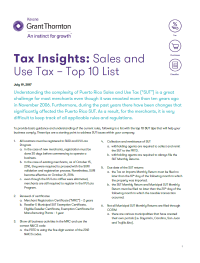Services
We approach each audit with sharp thought, straight talk and common sense. In addition to verifying that financial results are fairly presented and meet...
-
Financial statements audits
Financial statement audits
-
Compliance audits
Compliance audits
-
Compilations and reviews
Compilations and audit
-
Agreed-upon procedures
Agreed-upon procedures
At Kevane Grant Thornton, tax is a key part of our organization and our award-winning teams can offer you a range of solutions, whatever the size of your...
-
Corporate and business tax
Our trusted teams can prepare corporate tax files and ruling requests, support you with deferrals, accounting procedures and legitimate tax benefits.
-
International tax
Our teams have in-depth knowledge of the relationship between domestic and international tax laws.
-
Tax compliance
Business Tax
-
Individual taxes
Individual taxes
-
Estate and succession planning
Estate and succession planning
-
Global mobility services
Through our global organisation of member firms, we support both companies and individuals, providing insightful solutions to minimise the tax burden for both parties.
-
Sales and use tax and indirect taxes
SUT/ VAT & indirect taxes
-
Tax incentives program
Tax incentives program
-
Transfer Pricing Study
The laws surrounding transfer pricing are becoming ever more complex, as tax affairs of multinational companies are facing scrutiny from media, regulators and the public
As your business grows, our advisory services are designed to help you achieve your goals. Successful growth often means navigating a complex array of...
-
Business consulting
Our business consulting services can help you improve your operational performance and productivity, adding value throughout your growth life cycle.
-
Forensic and investigative services
At Grant Thornton, we have a wealth of knowledge in forensic services and can support you with issues such as dispute resolution, fraud and insurance claims.
-
Fraud and investigations
The commercial landscape is changing fast. An ever more regulated environment means organizations today must adopt stringent governance and compliance processes. As business has become global, organizations need to adapt to deal with multi-jurisdictional investigations, litigation, and dispute resolution, address the threat of cyber-attack and at the same time protect the organization’s value.
-
Dispute resolutions
Our independent experts are experienced in advising on civil and criminal matters involving contract breaches, partnership disputes, auditor negligence, shareholder disputes and company valuations, disputes for corporates, the public sector and individuals. We act in all forms of dispute resolution, including litigation, arbitration, and mediation.
-
Business risk services
We can help you identify, understand and manage potential risks to safeguard your business and comply with regulatory requirements.
-
Internal audit
We work with our clients to assess their corporate level risk, identify areas of greatest risk and develop appropriate work plans and audit programs to mitigate these risks.
-
Service organization reports
As a service organization, you know how important it is to produce a report for your customers and their auditors that instills confidence and enhances their trust in your services. Grant Thornton Advisory professionals can help you determine which report(s) will satisfy your customers’ needs and provide relevant information to your customers and customers’ auditors that will be a business benefit to you.
-
Transaction advisory services
Transactions are significant events in the life of a business – a successful deal that can have a lasting impact on the future shape of the organizations involved. Because the stakes are high for both buyers and sellers, experience, determination and pragmatism are required to bring deals safely through to conclusion.
-
Mergers and acquisitions
Globalization and company growth ambitions are driving an increase in M&A activity worldwide as businesses look to establish a footprint in countries beyond their own. Even within their own regions, many businesses feel the pressure to acquire in order to establish a strategic presence in new markets, such as those being created by rapid technological innovation.
-
Valuations
We can support you throughout the transaction process – helping achieve the best possible outcome at the point of the transaction and in the longer term.
-
Recovery and reorganization
We provide a wide range of services to recovery and reorganisation professionals, companies and their stakeholders.
Our outsourcing services allow you to save time and money in order to concentrate on the competencies and the core business activities.
Emerging markets and shifting consumer demand are creating new opportunities in food and beverage, with business leaders investing in new products, markets and...
Optimism is slowly returning to the global economy, but the financial services industry needs to regain the trust of public and private bodies. To succeed,...
Healthcare
Rapid change and complexity are norms, and innovation the fuel in the technology industry. Today’s revolutions – including cloud, as-a-service, social media...
Industrial products
Across the globe, not for profit organizations are increasingly expected to deliver more, while at the same time facing cuts in government funding and...
We work with all types of agencies, including central and state government, local government, donors (including bilateral and multilateral international...
While the impact of the prolonged downturn continues to be felt, pockets of opportunity and optimism have emerged within the retail estate and construction...
Services
Dynamic businesses need to move with speed and purpose if they want to capitalise on opportunities in hospitality and tourism. At Grant Thornton, we know...
Careers page for Kevane Grant Thornton
The Grant Thornton Difference
Grant Thornton prides itself on being a values-driven organization and we have more than 56,000 people in over 140 countries who are passionately committed to...
Learning and development
One of the biggest attractions of a career with Grant Thornton is the opportunity to work on cross-border projects all over the world.
Diversity helps us meet the demands of a changing world. We value the fact that our people come from all walks of life and that this diversity of experience...
Many Grant Thornton member firms provide a range of inspirational and generous services to the communities they serve.
Students
Experienced hires
Jobs at Kevane Grant Thornton
Understanding the complexity of Puerto Rico Sales and Use Tax (“SUT”) is a great challenge for most merchants even though it was enacted more than ten years ago in November 2006. Furthermore, during the past years there have been changes that significantly affected the Puerto Rico SUT. As a result, for the merchants, it is very difficult to keep track of all applicable rules and regulations.
To provide basic guidance and understanding of the current rules, following is a list with the top 10 SUT tips that will help your business comply. These tips are a starting point to address SUT issues within your company:
- All locations must be registered in SURI and IVU Loto Program
- in the case of new merchants, registration must be done 30 days before commencing to operate a business.
- in the case of existing merchants, as of October 15, 2016, they were required to proceed with the SURI validation and registration process. Nonetheless, SURI became effective on October 31, 2016.
- even though the IVU Loto raffles were eliminated, merchants are still required to register in the IVU Loto Program.
- Renewal of certificates
- Merchant Registration Certificate (“MRC”) – 2 years
- Reseller & Municipal SUT Exemption Certificate, Eligible Reseller Certificate, Exemption Certificate for Manufacturing Plants – 1 year
- Show all business activities in the MRC and use the correct NAICS code
- the PRTD is using the five-digit version of the 2012 NAICS codes.
- Collection and remittance of SUT
- withholding agents are required to collect and remit the SUT to the PRTD.
- withholding agents are required to always file the SUT Monthly Returns.
- Due date of the SUT returns
- the Tax on Imports Monthly Return must be filed no later than the 10th day of the following month in which the property was imported.
- the SUT Monthly Return and Municipal SUT Monthly Return must be filed no later than the 20th day of the following month in which the taxable transaction occurred.
- Not all Municipal SUT Monthly Returns are filed through COFIM
- there are various municipalities that have created their own portals (i.e. Bayamón, Carolina, San Juan and Trujillo Alto).
- Filing a Declaration of Imports when taxable items are imported into Puerto Rico
- effective August 1, 2014, every merchant that imports tangible personal property into Puerto Rico, by any means, including postal services, air carrier, maritime or any other method must submit a declaration.
- in the case of maritime carrier, the declaration must be filed as a prior requirement for taking possession of the imported tangible personal property.
- in the case of air carrier, even though the merchant already has possession of the tangible personal property, it must file a declaration.
- effective August 1, 2017, municipalities will no longer be collecting the 1% municipal portion corresponding to the imports for “use” in the business, thus allowing the PRTD to collect such tax and remitting it to the municipalities on a monthly basis.
- Auto-imposition of the 4% Special SUT when services are received from a merchant that is a non-resident of Puerto Rico
- for taxable services, services rendered to other merchants and designated professional services rendered on and after October 1, 2015, by a non-resident person to a person located in Puerto Rico, regardless of the place where the service was rendered, the person responsible for the payment must be the person who receives the service in Puerto Rico.
- Supporting documents for exempt transactions
- Certificate for Exempt Purchases and for Services Subject to the 4% Special SUT (Form AS 2916.1)
- copy of the Merchant Registration Certificate
- purchase Order
- copy of the Exemption Certificate for Manufacturing Plants, if applicable
- copy of the Tax Decree, if applicable.
- Avoid penalties
- merchants should try to avoid penalties related to late filing, late payment, failure to display Merchant Registration Certificate, failure to notify changes, failure to remit the SUT, failure to keep documents in compliance, among others.


